In Lua, I'm trying to pattern match and capture:
+384 Critical Strike (Reforged from Parry Chance)
as
(+384) (Critical Strike)
where the suffix (Reforged from %s) is optional.
Long version
I'm trying to match a string in Lua using patterns (i.e. strfind)
Note: In Lua they don't call them regular expressions, they call them patterns because they're not regular.
Example strings:
+384 Critical Strike
+1128 Hit
This is broken down into two parts that I want to capture:

- The number, with the leading positive or negative indicator; int his case is
+384 - The string, in this case is
Critical Strike.
I can capture these using a fairly simple pattern:

And this pattern in lua works:
local text = "+384 Critical Strike";
local pattern = "([%+%-]%d+) (.+)";
local _, _, value, stat = strfind(text, pattern);
- value =
+384 - stat =
Critical Strike
The Tricky Part
Now I need to expand that regular expression pattern to include an optional suffix:
+384 Critical Strike (Reforged from Parry Chance)
Which is broken down into:

Note: I don't particularly care about the optional trailing suffix; meaning that I have no requirement to capture it, Although capturing it would be handy.
This is where I start to get into issues with greedy capturing. Right away the pattern I already have does what I don't want it to:
- pattern =
([%+%-]%d+) (.+) - value =
+384 - stat =
Critical Strike (Reforged from Parry Chance)
But let's try to include the suffix in the pattern:

with the pattern:
pattern = "([%+%-]%d+) (.+)( %(Reforged from .+%))?"
And I'm using the ? operator to indicate 0 or 1 appearances of the suffix but that matches nothing.
I blindly tried changing the optional suffix group from parenthesis ( to brackets [:
pattern = "([%+%-]%d+) (.+)[ %(Reforged from .+%)]?"
But now the match is greedy again:
- value =
+384 - stat =
Critical Strike (Reforged from Parry Chance)
Based on the Lua pattern reference):
- x: (where x is not one of the magic characters ^$()%.[]*+-?) represents the character x itself.
- .: (a dot) represents all characters.
- %a: represents all letters.
- %c: represents all control characters.
- %d: represents all digits.
- %l: represents all lowercase letters.
- %p: represents all punctuation characters.
- %s: represents all space characters.
- %u: represents all uppercase letters.
- %w: represents all alphanumeric characters.
- %x: represents all hexadecimal digits.
- %z: represents the character with representation 0.
- %x: (where x is any non-alphanumeric character) represents the character x. This is the standard way to escape the magic characters. Any punctuation character (even the non-magic) can be preceded by a '%' when used to represent itself in a pattern.
- [set]: represents the class which is the union of all characters in set. A range of characters can be specified by separating the end characters of the range with a '-'. All classes %x described above can also be used as components in set. All other characters in set represent themselves. For example, [%w_] (or [_%w]) represents all alphanumeric characters plus the underscore, [0-7] represents the octal digits, and [0-7%l%-] represents the octal digits plus the lowercase letters plus the '-' character. The interaction between ranges and classes is not defined. Therefore, patterns like [%a-z] or [a-%%] have no meaning.
- [^set]: represents the complement of set, where set is interpreted as above.
For all classes represented by single letters (%a, %c, etc.), the corresponding uppercase letter represents the complement of the class. For instance, %S represents all non-space characters.
The definitions of letter, space, and other character groups depend on the current locale. In particular, the class [a-z] may not be equivalent to %l.
and the magic matchers:
*, which matches 0 or more repetitions of characters in the class. These repetition items will always match the longest possible sequence;+, which matches 1 or more repetitions of characters in the class. These repetition items will always match the longest possible sequence;-, which also matches 0 or more repetitions of characters in the class. Unlike '*', these repetition items will always match the shortest possible sequence;?, which matches 0 or 1 occurrence of a character in the class;
I noticed that there's a greedy *, and a non-greedy - modifier. Since my middle string matcher:
(%d) (%s) (%s)
seems to be absorbing text until the end, perhaps i should try to make it non-greedy, by changing the * to a -:
oldPattern = "([%+%-]%d+) (.*)[ %(Reforged from .+%)]?"
newPattern = "([%+%-]%d+) (.-)[ %(Reforged from .+%)]?"
Except now it fail to match:
- value =
+384 - stat = nil
Rather than the middle group capturing "any" character (i.e. .), I tried a set that contains everything except (:
pattern = "([%+%-]%d+) ([^%(]*)( %(Reforged from .+%))?"
and from there the wheels came off the wagon:
local pattern = "([%+%-]%d+) ([^%(]*)( %(Reforged from .+%))?"
local pattern = "([%+%-]%d+) ((^%()*)( %(Reforged from .+%))?"
local pattern = "([%+%-]%d+) (%a )+)[ %(Reforged from .+%)]?"
I thought that I was close with:
local pattern = "([%+%-]%d+) ([%a ]+)[ %(Reforged from .+%)]?"
which captures
- value = "+385"
- stat = "Critical Strike " (notice the trailing space)
So this is where I bang my head against the pillow and go to sleep; I can't believe I've spent four hours on this regex....pattern.
@NicolBolas The set of all possible strings, defined using a pseudo-regular expression language, are:
+%d %s (Reforged from %s)
where
+represents either the Plus Sign (+) or the "Minus Sign" (-)%drepresents any latin digit character (e.g.0..9)%srepresents any latin uppercase or lowercase letters, or embedded spaces (e.g.A-Za-z)- the remaining characters are literals.
If i had to write a regular expression that obviously tries to do what i want:
\+\-\d+ [\w\s]+( \(Reforged from [\w\s]+\))?
But I can give you near practically complete list of all values I'm likely to encounter in the wild if I didn't explain it well enough.
+123 Parrypositive number, single word+123 Critical Strikepositive number, two words-123 Parrynegative number, single word-123 Critical Strikenegative number, two words+123 Parry (Reforged from Dodge)positive number, single word, optional suffix present with single word+123 Critical Strike (Reforged from Dodge)positive number, two words, optional suffix present with two words-123 Parry (Reforged from Hit Chance)negative number, single word, optional suffix present with two words-123 Critical Strike (Reforged from Hit Chance)negative number, two words, optional suffix present with two words
There are bonus patterns it would seem obvious that the patterns would also match:
+1234 Critical Strike Chancefour digit number, three words+12345 Mount and run speed increasefive digit number, five words+123456 Mount and run speed increasesix digit number, five words-1 MoUnT aNd RuN sPeEd InCrEaSeone digit number, five words-1 HiT (Reforged from CrItIcAl StRiKe ChAnCe)negative one digit number, one word, optional suffix present with 3 words
And while the ideal pattern should match the above bonus entries, it does not have to.
Localization
In reality all "numbers" i am attempting to parse out will be localized, e.g.:
+123,456in English (en-US)+123.456in Germany (de-DE)+123'456in French (fr-CA)+123 456in Estonian (et-EE)+1,23,456in Assamese (as-IN)
Any answer must not attempt to account for these localization issues. You do not know the locale a number will be presented from, that is why the number localization has been removed from the question. You must strictly assume that numbers contain plus sign, hyphen minus, and latin digits 0 through 9. I already know how to parse localized numbers. This question is about trying to match the optional suffix with a greedy pattern parser.
Edit: You really didn't have to try to handle localized number. At some level trying to handle them, without knowing the locale, is wrong. For example, I didn't include all possible localizations of numbers. For another: I don't know what future localizations might exist in the future.